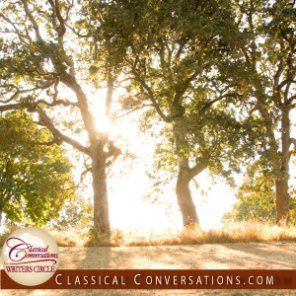“And there was evening, and there was morning, the first day.” When I read Scripture aloud with my children, I see things differently. Years ago, when my children were nine, seven, and four, we read through Exodus and the descriptions of the Tabernacle. Their curiosity caused me to see the story in a whole new way. “Mommy, what is jasper?” “What is onyx?” “What color is scarlet thread?” Instead of rushing through an assigned chapter a day, we lingered and beheld the beauty of the Tabernacle together.
This year, I went back to Genesis 1 for the first morning of school. The children are now fifteen, thirteen, nine, and five. What they saw was this pattern: “and there was evening, and there was morning, the _______ day.” We were struck by the importance of rhythms to our own day, particularly the way we open and close each day. For the last ten years, I have held the morning time of our home school to be sacred. We rise in the morning and start the day with family Scripture reading, prayer, and literature.
Over the years, we have read or listened to history together, studied famous scientists together, looked at art, and recited poetry. We recline on sofas and pillows so that we can begin the day with leisure. The posture of reclining invites contemplation and conversation. These morning times bind us together and set the tone for our day. We have listened to the cadences of the Psalms crafted in praise of God’s attributes and marveled at the metaphors of the New Testament designed to explain God’s Son. We have laughed at the schemes of The Great Brain, wondered about the hardships of life on the prairie, and wept over the deaths of beloved pets in American classics.
As my children grew older, I wondered if we could maintain this morning time together. Apparently, they cherish it as much as I do because they beg for our time even on the busiest day. These moments of contemplating the truths of Scripture, as well as beholding both the goodness and the hardships of life, prepare us to begin even the hardest days. “You shall go out with joy and be led forth with peace” (Isaiah 55:12).
I hold one other time of day to be sacred, and that is dinnertime. As often as possible, we eat together and have long discussions around the dinner table. One year, we spent two hours a night for ten nights discussing the Ten Commandments. At other times, we have talked about numbers together. My husband once explained Social Security to the children using pennies, nickels, and dimes. Another night, he drew supply and demand curves on paper towels to explain some basic principles of economics.
As this idea developed at home, I wanted to pay attention to the rhythm of evening and morning in my Challenge seminars as well. While studying Paul’s epistles, I saw a similar pattern of beginnings and endings. Paul’s epistles begin with him thanking God for his disciples and end with him encouraging his disciples; they begin with celebration and end with a charge. What an idea…that we would begin the day thanking God for these young people and end it by sending them out with a mission for the week.
It seemed good to begin with Paul’s letter, so we started with Romans 1:8-12:
To all that be in Rome, beloved of God, called to be saints: Grace to you and peace from God our Father, and the Lord Jesus Christ. First, I thank my God through Jesus Christ for you all, that your faith is spoken of throughout the whole world. For God is my witness, whom I serve with my spirit in the gospel of his Son, that without ceasing I make mention of you always in my prayers; Making request, if by any means now at length I might have a prosperous journey by the will of God to come unto you. For I long to see you, that I may impart unto you some spiritual gift, to the end ye may be established; That is, that I may be comforted together with you by the mutual faith both of you and me.
We opened with prayer that we would comfort and encourage one another in our mutual faith this year. We then dove in to math and Latin; we discussed heroism in Beowulf; we discussed the rise and fall of the Roman Empire and standards for beauty in art; we talked about rhetoric; we classified animals. And then we closed the day with Paul’s solemn charge from Romans 16:17–20:
Now I beseech you, brethren, mark them which cause divisions and offences contrary to the doctrine which ye have learned; and avoid them. For they that are such serve not our Lord Jesus Christ, but their own belly; and by good words and fair speeches deceive the hearts of the simple. For your obedience is come abroad unto all men. I am glad therefore on your behalf: but yet I would have you wise unto that which is good, and simple concerning evil. And the God of peace shall bruise Satan under your feet shortly. The grace of our Lord Jesus Christ be with you. Amen.
In His providence, God knit together our day with these words. We read Paul’s letter to the Romans on the same day we studied the Roman Empire. We read the solemn warning against using “good words and fair speeches” to “deceive the hearts of the simple” on a day when we defined rhetoric.
Over the years, I have come to realize that we must intentionally establish these rhythms for the day. It sounds like a contradiction, but we must plan for leisure. In the classical world, leisure was perceived very differently. In his book Leisure: The Basis of Culture, Josef Pieper reveals that our word for school (Greek, skole; Latin, scola) is literally translated as “leisure.”
When I first read these words, I could not conceive of a connection between my home school and leisure. After all, I have to teach four children of wildly varying ages. During the day, I must teach history, science, literature, Bible, spelling, math, handwriting, phonics, and Latin. Then, of course, there are the fine arts and . . . after that, of course, I must prepare meals, tend to my home, and drive everyone to activities. I could not see what leisure has to do with any of this.
Pieper demonstrates that we moderns are trapped in a culture that views the weekends as much-needed rest to “recharge the batteries” in order to return to work on Monday. In other words, the focus of life has become work. In the classical world, the focus of life was not work, but leisure. Aristotle put it this way, “we are unleisurely in order to have leisure” (Pieper, 20). In other words, the ancients worked that they might have leisure. This is the dead opposite view of “we rest in order to work again.”
Instead of looking on each day as a long task list to rush through, we should look upon the day as a feast of good ideas, good conversations, and good work. We should cultivate rhythms that allow us to share good stories with one another, to prepare meals together, and to linger over those meals.
I believe God established these rhythms to teach us how to live as humans created in His image. It is good for us to marvel at His creation every day by studying science. It is good for us to share stories together every day because we are imitators of a God who has revealed himself to us in the written word. It is good for us to recite poetry together and enjoy the rhythms of speech because language is the hallmark of creatures made in His image. It is good for us to attend to the beginning and end of every day, to mark the rhythms of evening and morning, to begin in praise and to go forth on a mission.
“So teach us to number our days, that we may apply our hearts to wisdom” (Psalm 90:12 Webster).




